Tell us about your background and why you wanted to get into English wine?
Farming has been in my blood since childhood, starting out by helping my father on a farm, where we worked with Aberdeen Angus. At 21 I moved to Kent and expanded my experience into horticulture, working in orchards and soft fruit farms, gaining valuable knowledge in irrigation and nutrition. In 2008, I moved to the New Forest, where I became a partner in a soft fruit business and a tenant farmer on the Beaulieu Estate. My venture into viticulture happened purely by chance, when Lord Montagu invited me to take on the Beaulieu vineyard, an unexpected opportunity.
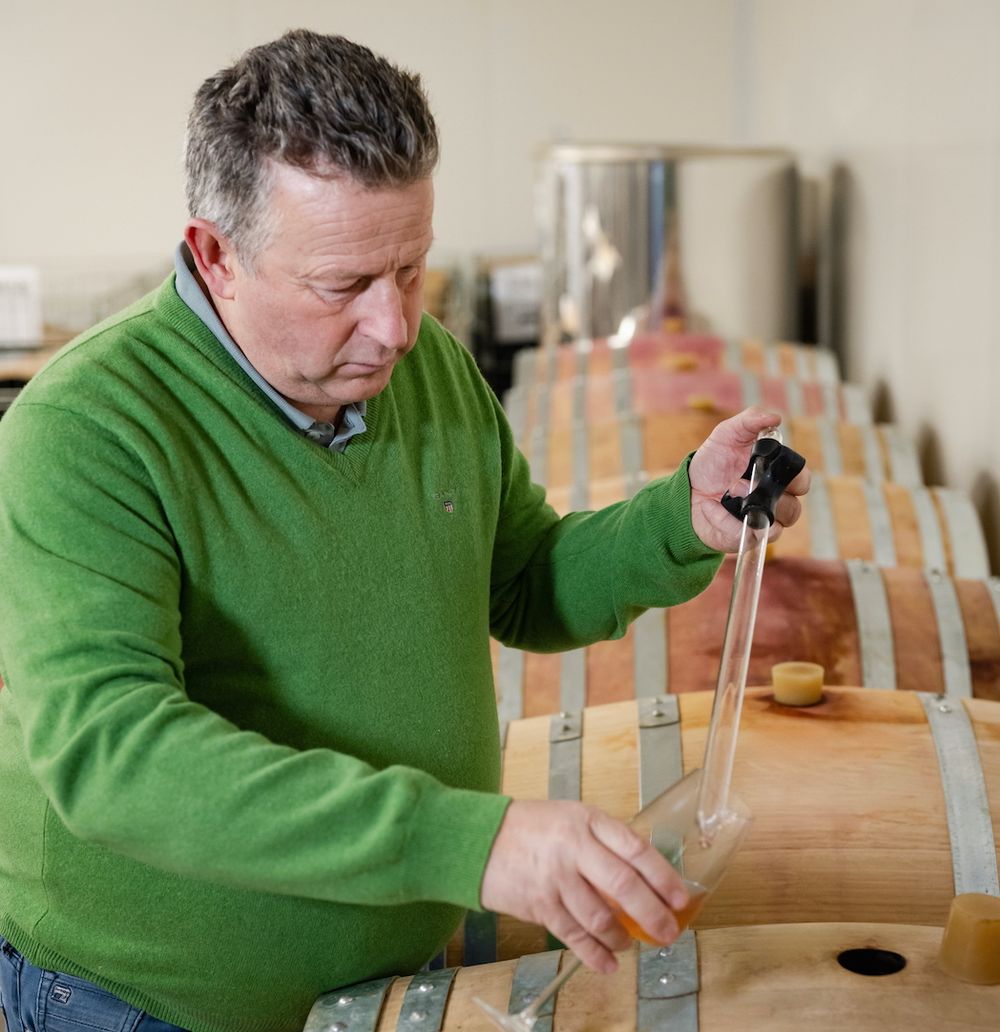
Sandy Booth is bringing all the knowledge and expertise from soft fruit farming into English viticulture and winemaking
Because I have always loved a challenge, I took it on without hesitation. It has been, and still is, a tremendous learning curve. My brother-in-law - who is responsible for nutrition on the farm - and I threw ourselves into this new venture. We visited other vineyards, engaged with experienced growers, read extensively and conducted thorough research to deepen our understanding.
Throughout the growing season, we also benefit from regular visits by advisor Penny Meadmore, ensuring we continuously refined our approach and bounce off ideas.
What learnings are you taking from soft fruit production into winemaking?
In our soft fruit and asparagus business, we have always embraced a holistic approach, utilising a range of sustainable methods such as tunnels, rainwater harvesting, bio-fertilisers, integrated farm management, residue-free farming, and innovative technologies. When we took on the vineyard, we applied these same principles to viticulture, ensuring that our practices were not only efficient but also environmentally responsible.
Just as we do with our strawberry plants, we regularly send vine leaf samples for analysis to identify any nutrient deficiencies (SAP analysis) and determine the precise feed required. This proactive approach allows us to tailor our nutrition program to the vineyard’s specific needs, ensuring healthy vine growth and optimal fruit quality. By applying the same attention to detail and scientific methods used in our soft fruit farming, we continue to improve the health and productivity of our vines.
Do you think it gives you a head start versus other winemakers in terms of what you need to get right and prioritise etc?
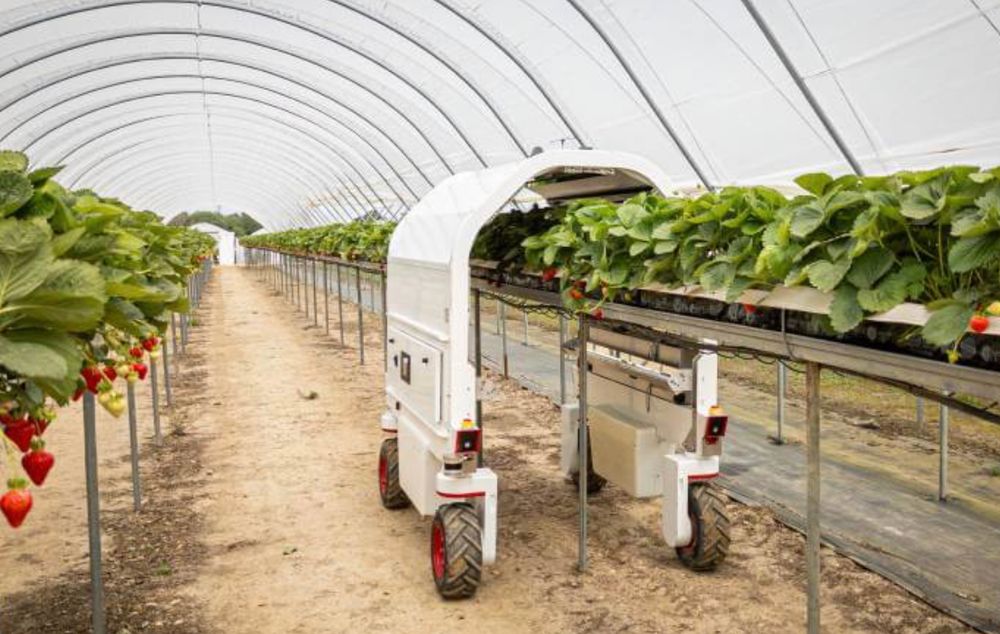
Sandy Booth believes there is much for English wine producers to learn from the soft fruit industry in terms of its farming and sustainabiilty practices but also how it is using science, technology and AI
I have no doubt that there are many experienced wine growers out there, as well as passionate hobbyists with great ideas and enthusiasm. Don’t get me wrong, I admire their dedication. However, what sets us apart is our highly knowledgeable team, backed by years of hands-on experience in fruit growing. Our deep understanding of plant nutrition, disease management and sustainable farming practices has given us a strong foundation as we navigate the world of viticulture.
Why did you want to plant vines and make wine in the New Forest?
I never imagined growing vines in the New Forest, until I was asked in 2019 to take on the Beaulieu vineyard. Although the idea of owning a vineyard was floating for a number of years. Over the years, we experimented with various crops to support our strawberry business, trying everything from cherries, peaches and nectarines to artichokes, melons and haskaps.
More recently, we successfully introduced asparagus, which complements our main strawberry harvest. Growing vines, however, happened purely by accident. But as someone who enjoys a glass or two of good wine, I saw an opportunity, not just to grow grapes, but to produce a high-quality still wine that reflects our dedication to farming and innovation.
You have a strong background in sustainability - how are you taking that forward with the wines you are making and how you are making them?
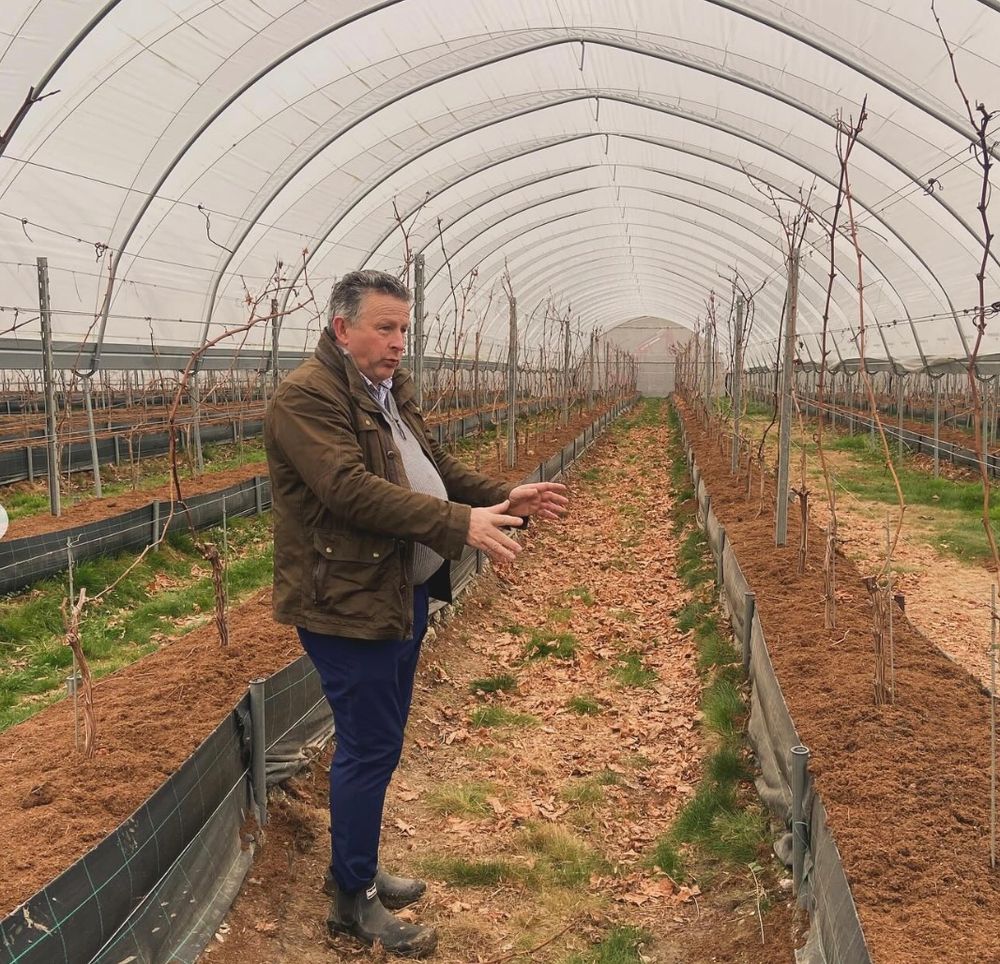
At Beaulieu58 it is using polytunnels to grow vines in the same way Sandy Botth uses in his soft fruit business. Picture Rebecca Pitcairn (@theenglishwinediaries)
With sustainability always top of mind with everything we do on our farm from strawberries to vines, we constantly look to minimise human intervention and instead enable and encourage nature to do what it does best. With regards to the vines, our low intervention methods, amongst other things, enable us to be as sustainable as we can be, while always striving to be even more so as our knowledge and experience grows.
What sustainability measures and techniques are you bringing over from soft fruits into wine?
Sustainability is at the core of our business. The majority of our grapes are grown in tunnels, which provide protection from unpredictable weather, resulting in healthier fruit, reduced waste, and significantly less need for spraying, especially against mildew.
Our vines are grown in beds using a combination of soil and recycled coir, which enhances root development and sustainability. To further improve soil health and crop resilience, we enrich the soil with humates, beneficial bacteria, and trichoderma.
Every aspect of our growing strategy is designed to create the most favourable environment for our vines while minimising reliance on commercial fertilisers and unnecessary chemical inputs. This approach not only benefits our crops but also aligns with our commitment to responsible and regenerative farming.
Would you recommend other English producers to look at what is happening in other agricultural areas - like soft fruits?
Absolutely. The wine industry and winemaking are deeply rooted in tradition, and there’s often a fear of change. But why not embrace innovation? Just because something has been done for centuries doesn’t necessarily mean it’s the best or only way.
As a soft fruit industry, we are moving forward rapidly, with extensive research and new practices available to improve both sustainability and quality. At the end of the day, most people simply want to enjoy a good glass of wine and appreciate where it comes from. If that wine is grown under tunnels using sustainable methods rather than on rolling hills, does it really matter? More and more consumers are conscious of the environmental impact of their choices and I hope they will appreciate the care and responsibility we put into the way we grow our grapes.
You are also using robotic technology? Tell us more about that.
Last year, we conducted trials on the vineyard with a picking robot from Tortuga AgTech, exploring how automation could support our harvest process. AI technology is already an integral part of our farm, assisting with various tasks, from yield data collection to UV-C light treatments and pack house operations. These innovations help us to improve efficiency, reduce labour-intensive work and enhance sustainability.
How did you get together with winemaker, Guillaume Lagger, and why did you want him to help you make your wines?
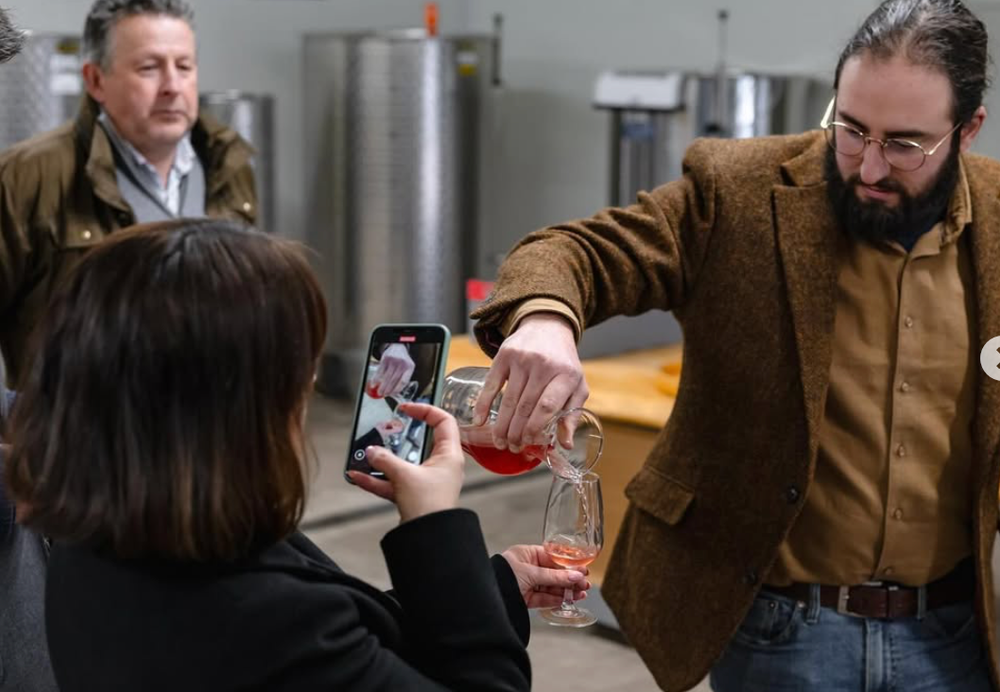
Swiss winemaker Guillaume Lagger is looking to experiment with a wide vareity of grapes including Shiraz and Gewürztraminer at 58 Beaulieu
I am a grower, not a winemaker or oenologist, and I recognise that making wine requires a completely different set of skills. That’s where Guillaume comes in. He is based locally and I had heard many positive things about this talented Swiss winemaker.
When I approached him, we instantly clicked. Like me, Guillaume is passionate about pushing boundaries and believes in a low-intervention approach to winemaking. His philosophy aligns perfectly with our sustainable growing methods, and together, our skills complement each other. It’s an exciting collaboration that brings the best of both worlds, expert viticulture and innovative winemaking.
What wines are you making?
We are focused on making still wines, and I want to prove that high-quality red wines can be produced in the UK. While the country is traditionally known for sparkling wines, we are pushing the boundaries by growing varieties not typically cultivated here, such as Pinot Noir, Gewürztraminer, Floreal, Tempranillo, Grenache, Syrah, Merlot, Albariño, Cabernet Jura, Pinotin, Cabernet Franc and Bacchus.
By experimenting with these varieties and applying our sustainable growing techniques, we aim to showcase the potential of UK viticulture and produce wines that challenge expectations.
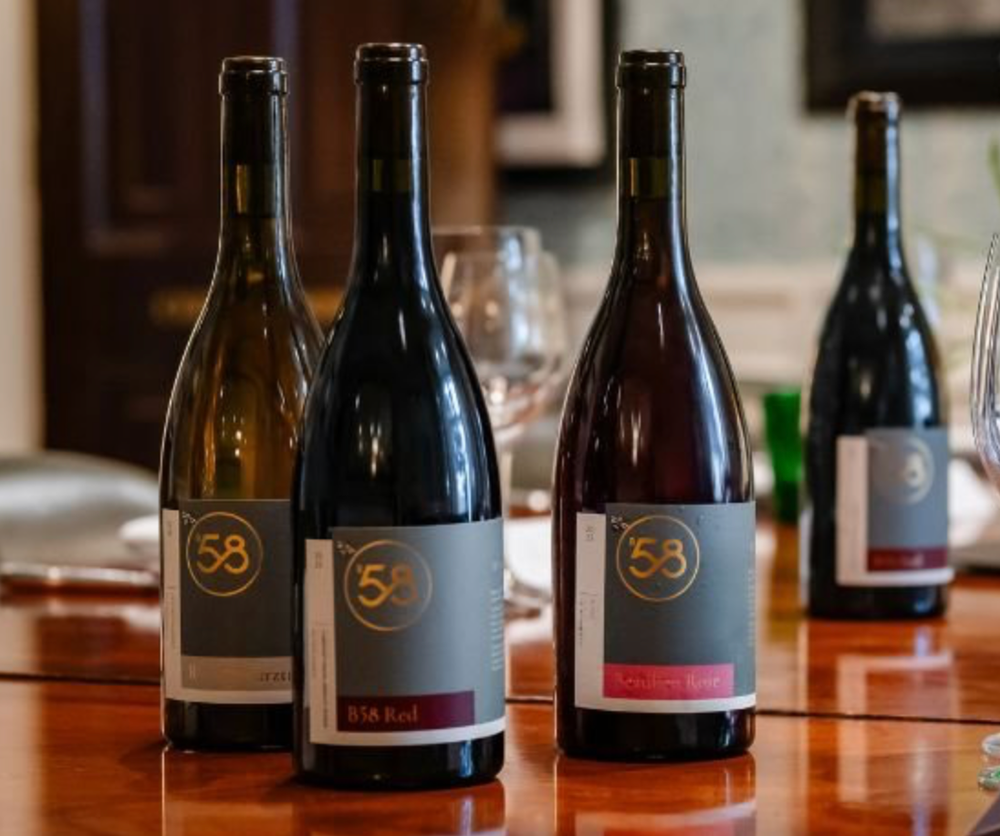
Some of the wines in the Bealieu 58 range
So far we have made B58 Red (A blend of Shiraz, Merlot, Cab Franc, Cab Jura), Beaulieu Red (A blend of Pinotin and Cab Jura), Beaulieu 58 Rosé (Cab Noir, Pinot Noir) and B58 Gewürztraminer.
Who is your target market for your wines?
Our target market is locally in Hampshire and nationally in the UK with a view to extend this to Europe potentially in the future.
Our target audience are people who are looking for UK still wines from anything from every day consumption to special occasions or specific pairings with food. This audience cares as much about where the vines are planted, grown and harvested as the quality of the wines themselves. They are loyal to brands that are innovative, environmentally focused and UK based, thus reducing the impact on the climate and nature.
How are you marketing and distributing the wines?
We currently have a website and social media with Instagram and sell directly to customers through our website.
Do you have a distributor and if not, what sort of business are you ideally looking to work with?
It’s very early days and the quantities we have to sell from our first harvest haven’t enabled us to working with a distributor yet. However, with higher yields and an increase in bottles going forward, this may be something we will consider looking into.
Anything else to say?
We’re approaching this from a new and exciting perspective and very much look forward to introducing people to even more new varieties over the coming years. We’re sure we’ll come across some ‘bumps in the road’ but we’re always up for a challenge.
Beaulieu 58 Wines – Inaugural Releases:
B58 Gewürztraminer (ABV: 12.2%, RRP £30)
· Grape Variety: 100% Gewürztraminer
· Description: A dry, aromatic white with a fragrant character and a rich profile – ideal for pairing with spicy cuisine, aromatic cheeses, or enjoyed on its own. The Gewürztraminer grape is not usually grown in England and the use of new oak barrels enhances the complexity of this wine.
· Tasting Notes: With a pale golden hue and enticing aromas of lychee and rose petals, this wine delights the palate with a delicate acidity.
· Medals: Bronze at Wine GB Wessex Awards 2024
B58 Red (ABV: 13.5%, RRP £35)
· Grape Varieties: 30% Shiraz, 30% Merlot, 30% Cabernet Franc, 10% Cabernet Jura
· Description: A medium to full bodied red with a deep colour, offering a bold and rich, yet balanced taste experience.
· Tasting Notes: Aromas of rich blackcurrant, blackberry and plum flavours and a hint of spice and oak. Velvety tannins and a touch of nuttiness create a balanced and well-rounded lingering finish. Perfect for pairing with grilled meats, hearty stews or aged cheeses, this wine delivers a rich and memorable tasting experience.
· Medals: Silver at Wine GB Wessex Awards 2024
Beaulieu 58 Rosé (ABV: 11.5%, RRP £15)
· Grape Varieties: 75% Pinotin and 25% Cabernet Jura
· Description: A field blend crafted from grapes harvested on the same day and pressed together, producing a medium-bodied rosé.
· Tasting Notes: With vibrant notes of ripe soft fruits, a hint of citrus zest and a subtle acidity, Beaulieu Rosé has a refreshing, yet smooth finish. Perfectly suited for alfresco dining, an ideal companion for seafood or enjoyed chilled on a warm evening.
* You can find out more about Beaulieu58 Wines at its website here.






























